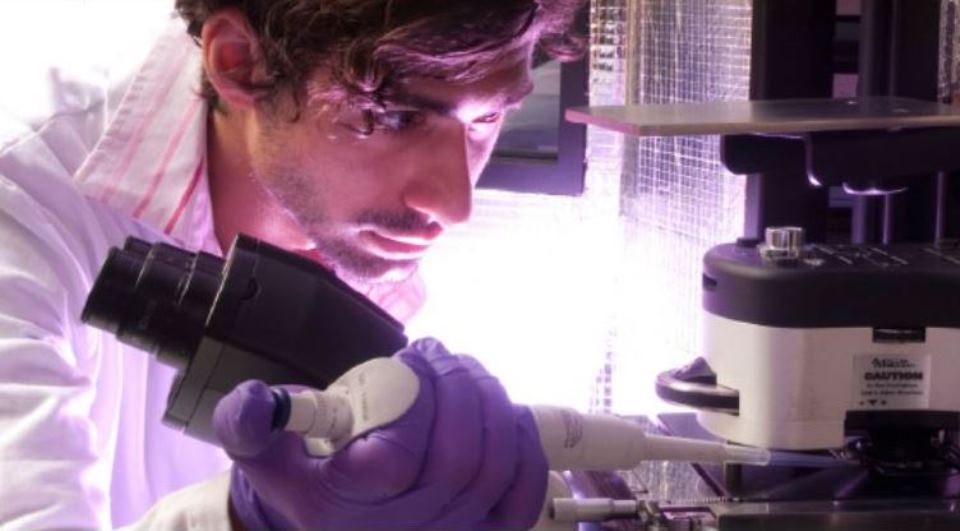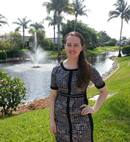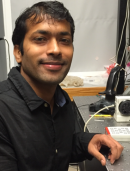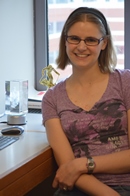
Atomic force microscopy experiment being done by Matt.


Atomic force microscopy experiment being done by Matt.
All good students and post doctoral must leave the nest. Below are former lab members who have flown off to new adventures.

Amy Weil, PhD
Post doctoral fellow
amygum@sas.upenn.edu
215-573-7997
Amy is investigating the mechanisms of eukaryotic translation elongation using a purified eukaryotic in vitro translation system. Amy's major area of interest is understanding the mechanism of translational readthrough of premature termination codons, which are linked to over 200 genetic disorders.
Publications click here:

Matt Caporizzo, PhD
Post doctoral fellow in Insitute for Medicine and Engineering
mcaporizzo@gmail.com
610.742.9987
Composto Polymer Research Group/Department of Material Science (NIH T32 through the Institute for Medicine and Engineering: PI Peter Davies, PhD) and Pennsylvania Muscle Institute/Department of Physiology
Matt focuses on bridging the gap between materials science and single molecule biophysics. Matt's projects range studying how charged nanoparticle can alter actin structure and molecular motor activity, to investigating how myosins and other cytoskeletal proteins contribute to single cell viscoelasticity. Currently, Matt is working on understanding how the orientation of the coil-coil domain in myosin X, the most up-regulated molecular motor in cancer, leads to altered processivity. Matt is also extending single-molecule super-resolution techniques towards understanding particle diffusion in crowded/caged environments.
Publications click here:

Vijay Singh, Ph.D.
Post doctoral fellow
vijaysin@mail.med.upenn.edu
267-934-6403
Vijay is investigating the elongation cycle dynamics of the Ribosome by using an in-vitro translation system. The major focus of his research work is to investigate the correlation of distance changes between EF-G and tRNA or subunit protein L11 measured by smFRET and rotational dynamics of EF-G.
Publications click here.

Vishakha Karnawat
Post doctoral fellow
vishakha.karnawat@gmail.com
215-898-4247
My project involves understanding the chemomechanical mechanism of the dynein motor protein using single molecule polarized TIRF microscopy. My work focuses on determining the orientation and rotational motions of the dynein motor domains tagged with nanorods while moving along microtubules. Understanding domain changes in dynein is key to determining the dynein stepping mechanism.
Publications click here.

Lisa Lippert
Graduate Student in Biochemistry and Molecular Biophysics
llippert at mail.med.upenn.edu
215-898-4247
Lisa is developing a polarized fluorescence imaging technique for simultaneous detection of position and orientation of fluorescence molecules and methods to functionalize semiconducting nanoparticles for attachment to proteins. Lisa is using these techniques to study ring domain rotations of cytoplasmic dynein as it walks along microtubules.

Ryan Jamiolkowski
MD, PhD Student in Bioengineering
ryanjam@mail.med.upenn.edu
215-898-4247
Ryan is using single molecule techniques to study ribosome dynamics during translation, as well as nanofabricating new tools for single molecule study.

Michael Woody
Graduate student in Biochemistry and Molecular Biophysics
mwoody at mail.med.upenn.edu
215-898-4247
Michael develops and uses advanced optical trapping methods to study force production of single molecules. He is currently trying to observe and understand ultra-fast mechanical transitions and force dependence in beta cardiac myosin.

Claire Fishman
Undergraduate in Chemistry
fishmanc@sas.upenn.edu
215-898-4247
Claire is an undergraduate interested in majoring in Biological Basis of Behavior and Chemistry. She is collaborating with Matt in studying the processivity of the molecular motor myosin X.

Kevin Chen
Undergraduate in the Department of Physics and Biochemistry
chekevin@sas.upenn.edu
510-676-7592
Kevin is a Physics major in the College interested in exploring the field of biophysics, particularly optics and single molecule techniques. He is helping Ryan develop a protocol for nanofabricating zero mode waveguides, which will allow single molecule experiments on actively translating ribosomes at physiologic concentrations. In his spare time, he enjoys collecting and tasting different varieties of teas, eating new (or free) foods, and attempting to cook.

Jeffrey Hallock
B.S.E. Material Science, Physics, Mathematics
jhallock7@gmail.com
215-898-4247
Jeffrey's primary responsibility is conducting independent control experiments and measurements in support of a primary lab project applying a novel microscopy technique to study molecular motors. Of particular interest was obtaining a precise measurement of the streptavidin content of in-house-made quantum rods. A MATLAB analysis program was written to heuristically determine relevant data parameters. Jeffrey also assisted in optimizing quantum rod water-solubilization and streptavidin coating methods, and also seeded an extension of the project to a different molecular motor.
© The Trustees of the University of Pennsylvania | Site best viewed in a supported browser. | Report Accessibility Issues and Get Help | Privacy Policy | Site Design: PMACS Web Team.